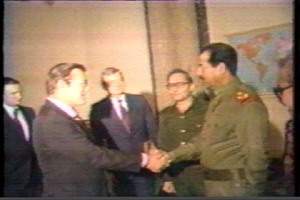

Originally Posted by
Anc' Mariner

True, but as you colorfully mentioned once Pb - the most rapacious and unrepentant minds hide their iron fist (claws?) beneath the soft but false veneer of a velvet glove.
The elites saw fit to furnish the crooked (and therefore easy to manipulate) secular nationalist Saddam with some pretty nasty items, because he was willing to send young men to fight against something the elites feared much more: the mass movement of principled theocratic socialism (whatever its archaicisms) represented by Khomeini.
Someone as unprincipled as Saddam Hussein is easy to manipulate for a while. He was clever enough to play the United States against the Soviet Union for his personal gain and the enhancement of his ego. Both tolerated his crimes for their own cynical reasons. In his case he let it go to his head and thought himself a great enough leader to begin a course of conquest that began with Kuwait. Then he started to look like another Napoleon or Hitler, and both the United States and the Soviet Union turned on him.
"Neighborhoods" are not the same as spheres of influence, but once the lion cub starts getting big enough to kill pets...
Unprincipled despots are a dime a dozen. Principled movements are much more versatile, because they do not solely depend on any leader. Plutocrats, who prefer to rule by opportunistic peer networks that hide from the light of day, hate that the common people might see their real practices.
It is no longer so easy to build an Empire. The United States is now one of the oldest -- and it was established as an empire in scale with the Treaty of Paris in 1783. It expanded mostly by picking off pieces of weakened empires -- a purchase here and a cheap conquest there, with the takeover of a puppet state in bad fiscal shape (the Republic of Texas) -- until 1898, when it took Puerto Rico and the Philippines from Spain. The great colonial empires that 'painted the globe red' or started teaching children from textbooks that 'our ancestors were Celts with red hair and blue eyes' disintegrated after World War II. The colonial empires were just too vulnerable to the attention of other colonial powers that tried to imitate France, Britain, America, and Russia. In the Pacific theater, most of the war outside of China was over colonies from British India to the Dutch East Indies to Guam. Technically, even Hawaii and Alaska were still colonies during World War II.
Empire-building is generally seen as futile -- but it takes only one upstart power to start it. If that ever happens and goes to any great scale, then World War III is underway.
Good law protects the common people, by setting out mutual duties and standards that apply to the rich and poor alike. The well connected and those who find themselves alone. Law is the great equalizer.
Good law -- so long as it is effectively and fairly enforced. Bad law, whether laws persecuting sorcerers, the Fugitive Slave Law, Prohibition, Article 58 of the Soviet Criminal Code, the Nuremberg Laws, or laws proscribing homosexuality (no attempt at equating those), gets bad results even if effectively enforced.
Long ago, money changers paid a share of their financial gains to the Temple. A physical structure that represented the Idea of unity and self sacrifice for the good of the whole. Not leveling the high, but bringing their assets to positive use for the evolution of the species.
Some people still remember that. Poor people need goals and ideals to look up to. Not just bread for the day. Ideals. Good role models willing to sacrifice for the greater good.
Noblesse oblige is good practice. Economic elites can act fairly and humanely. But they cannot operate fairly and humanely out of fear alone. They need to have or at least simulate humanitarian tendencies.
All For the Few does not create good will.
The greatest evil is not now done in those sordid "dens of crime" (or) even in concentration camps and labour camps. In those we see its final result. But it is conceived and ordered... in clean, carpeted, warmed and well-lighted offices, by (those) who do not need to raise their voices. Hence, naturally enough, my symbol for Hell is something like the bureaucracy of a police state or the office of a thoroughly nasty business concern."
― C.S. Lewis, The Screwtape Letters



